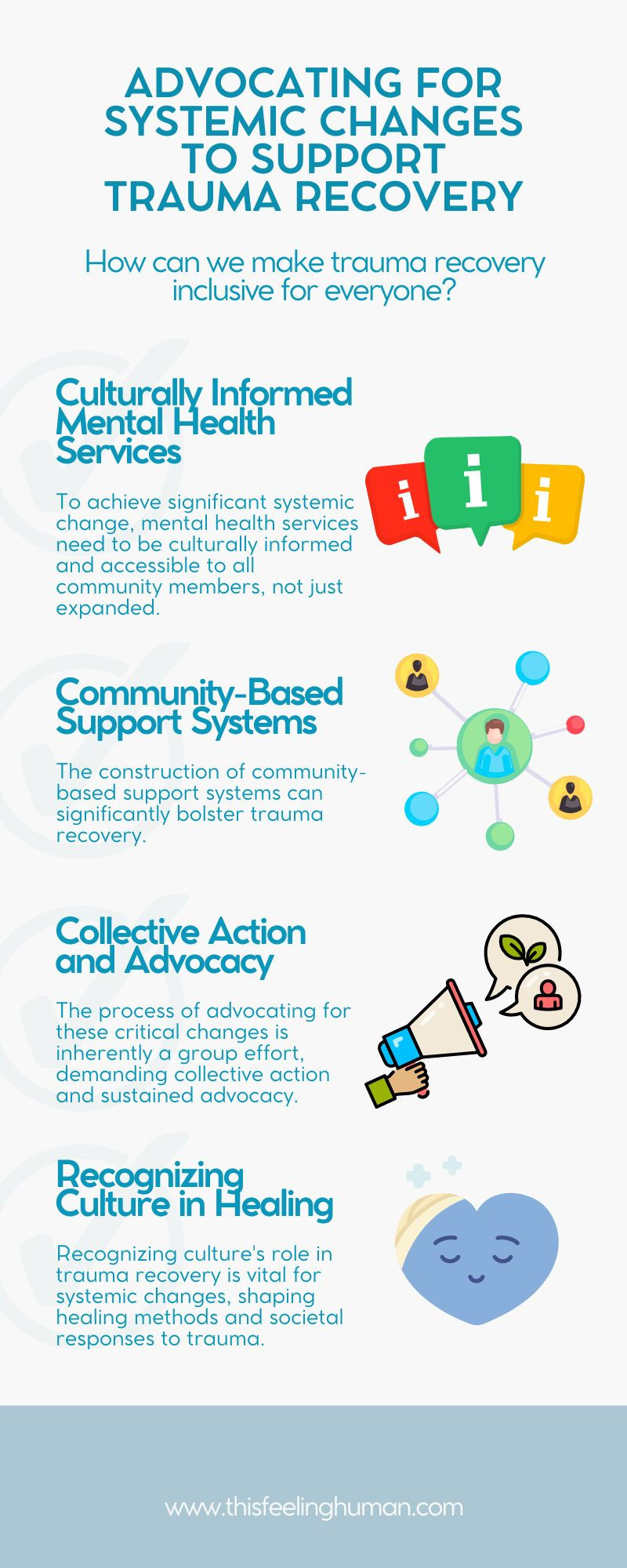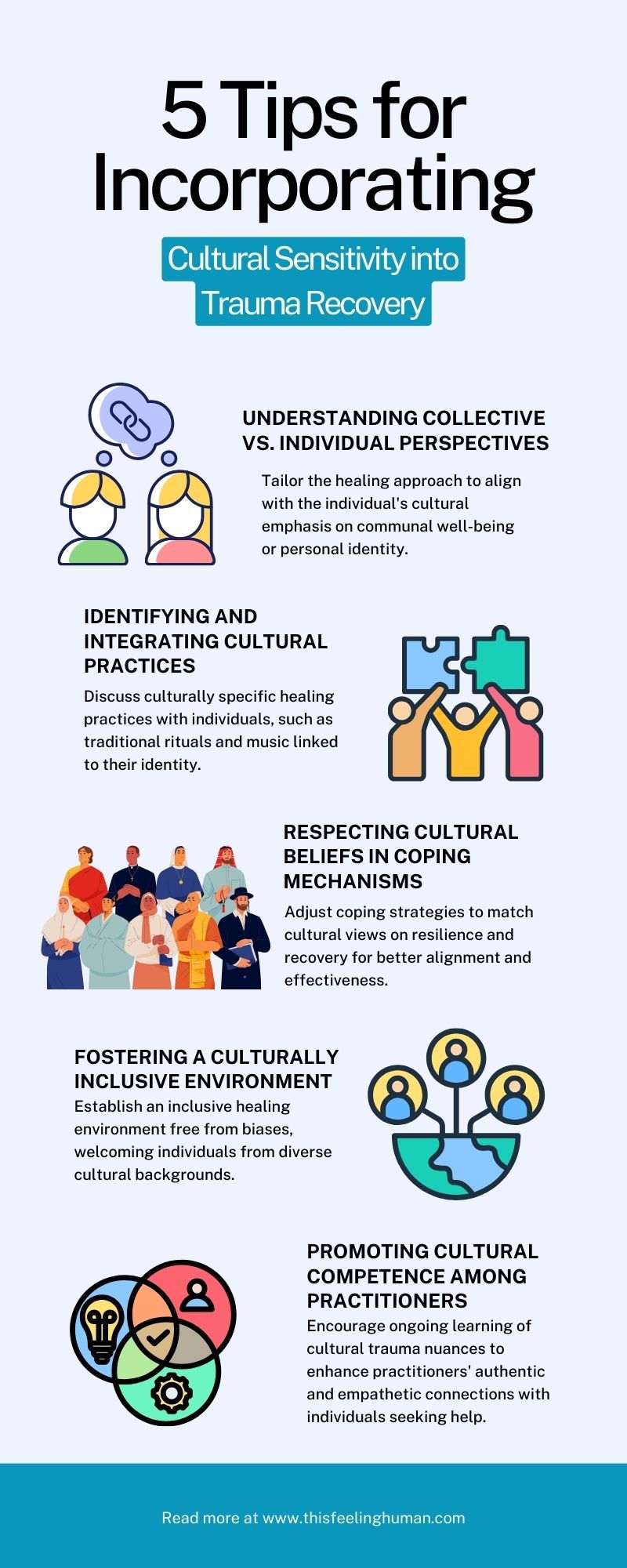The Silent Struggle | Advocating for Systemic Support in Trauma Healing and the Cost of Hiding Feelings
- TFH

- May 24, 2024
- 4 min read
Updated: Aug 7, 2024
To support trauma recovery on a broad scale, initiating systemic changes embracing cultural sensitivity and social understanding is crucial. This comprehensive advocacy of systemic change seeks to influence policy, redistribute resources, and create support systems that acknowledge and integrate the cultural dimensions of healing.
Culturally Informed Mental Health Services
To achieve substantial systemic transformation, we must look beyond merely expanding mental health services to ensure these services are culturally informed and accessible to every member of the community. This entails:
Providing cultural sensitivity training for healthcare providers to enhance their understanding and ability to work effectively with diverse populations.
Implement policies that support traditional healing practices, recognizing them as valuable and effective counterpoints to Western medical approaches.
Community-Based Support Systems

Moreover, the construction of community-based support systems can significantly bolster trauma recovery. Initiatives to consider include:
Establish peer support groups that offer comfort and camaraderie, enabling individuals to share experiences and coping strategies within a culturally aware setting.
Creating local trauma-informed care training programs to educate community members and professionals on the importance of cultural competence in trauma response.
Organizing public outreach to normalize conversations about trauma and recovery and to inform the public about the available resources and support.
Collective Action and Advocacy
The process of advocating for these critical changes is inherently a group effort, demanding collective action and sustained advocacy. We must:
Unite individuals across a wide array of cultural backgrounds and disciplines to forge a pluralistic front advocating for a comprehensive trauma recovery model.
Ensure survivor voices are at the core of advocacy efforts, leveraging their unique insights and lived experience to inform systemic improvements.
Recognizing Culture in Healing
The adoption of systemic changes for trauma recovery is deeply connected to recognizing the integral role of culture in healing methods, as well as the societal perceptions that influence our interpretation and response to trauma. As we endeavor to secure a more compassionate and effective trauma recovery landscape, our collective responsibility is to embrace diversity, foster collaboration, and remove structural hurdles that limit access to appropriate care.
Unmasking the Burden: The True Cost of Hiding Your Feelings
Often in life, we find ourselves donning masks—not the tangible kinds, but emotional ones that shroud our true feelings. Whether due to fear of judgment, the desire to belong, or simply the intent to avoid conflict, we frequently conceal what we truly feel. However, what appears to be a short-term solution often turns into a long-term drain. Hiding your core feelings doesn't just keep others at bay; it can sap your energy, diminish your motivation for worthwhile goals, and leave you feeling disengaged and listless. Today, we delve into why expressing our emotions is crucial for our mental and physical well-being.
The Energy Cost of Emotional Concealment
At first glance, suppressing emotions might seem like avoiding unnecessary conflicts and smooth sailing. However, the energy required to manage and mask our true feelings is significant. Keeping emotions bottled up demands constant vigilance—as if one part of your brain is always on guard, monitoring what to express and what to hide. This ongoing internal struggle is exhausting and can lead to anxiety, depression, and even physical health issues such as insomnia or high blood pressure.
Understanding this hidden toll is crucial in advocating for systemic support in trauma healing. To address these challenges and support emotional well-being, we’ve partnered with The School of Emotions to offer Emoli Cards. These cards help uncover the deeper narratives and purposes behind our feelings.
Additionally, our Emotion-Based Coaching includes Emoli Cards, Calm3D for mood regulation, and life coaching sessions to assist individuals in understanding and managing their emotions more effectively. This holistic approach aims to alleviate the silent struggle of hiding feelings and promote a healthier, more resilient emotional state.

Motivation and Goal Achievement
Emotions are deeply tied to our motivation. They drive our passions and fuel our commitments. When we disconnect from our emotions, we cut off the very energy that drives us towards our goals. This disconnection leaves us feeling unanchored and can rob us of the enthusiasm required to pursue what we genuinely care about. Without emotional engagement, even the most sought-after achievements can feel empty and unrewarding.
The Dullness that Follows
Perhaps one of the most disheartening outcomes of hiding your feelings is the pervasive sense of boredom and emptiness that seeps into every corner of life. Emotions, whether positive or negative, bring color and intensity to our experiences. They help us navigate the world and connect deeply with others. Without them, our lives can quickly become monotonous and uninspiring. The lack of emotional expression can shut us down, making us feel withdrawn and disconnected from both our own lives and the people in them.
Steps Towards Emotional Freedom
Acknowledge Your Feelings: Start by recognizing and naming your emotions. Understanding what you feel is the first step towards expressing those feelings effectively.
Communicate Openly: Find a safe space or person with whom you can share your feelings. Honest communication can alleviate the burden of carrying your emotions alone.
Seek Professional Help: Sometimes, the roots of emotional concealment are deep and complex. Therapists can provide the tools and space to understand and work through these feelings.
Practice Self-compassion: Be kind to yourself during this process. Recognize that managing emotions is a skill that requires practice and patience.
Engage in Activities That Stir Your Emotions: Reconnect with hobbies or interests that spark joy, excitement, or even sadness. Allowing yourself to fully experience these emotions can be incredibly liberating.
Conclusion
Unmasking your feelings and choosing vulnerability over concealment doesn't just alleviate emotional exhaustion; it paves the way for richer, more authentic interactions and a fulfilling life. It's time we embrace the beautiful, messy spectrum of our emotions and allow ourselves to live openly and genuinely. After all, the energy spent in hiding our feelings is far better used in pursuing our passions and celebrating our true selves. Remember, every emotion, even the painful ones, leads us to deeper understanding and growth.


Comments